Introduction
How To Care For A Pigeon: Pigeons, often overlooked and sometimes even considered pests, are fascinating and intelligent birds that can make surprisingly rewarding companions when cared for properly. Whether you’ve found a wounded pigeon in need of help, or you’re interested in keeping one as a pet, understanding how to care for these birds is crucial for their well-being. The essentials of pigeon care, from creating a suitable habitat to providing the right diet and offering companionship.
You can ensure that your pigeon lives a healthy and happy life under your care. Pigeons, scientifically known as Columba livia domestica, have a long history of interaction with humans. They’ve been used as messenger birds, symbols of peace, and even as performers in various cultural events. Despite their urban presence in many cities worldwide, these birds often face challenges in finding proper care and understanding from humans. We will delve deeper into the intricacies of pigeon care.
We’ll discuss creating a suitable living environment, maintaining proper hygiene, addressing potential health concerns, and fostering a bond with your pigeon companion. Whether you’re an experienced pigeon enthusiast or a newcomer interested in providing a safe and nurturing environment for these birds, this guide will equip you with the knowledge and skills needed to ensure the well-being of your pigeon friend.
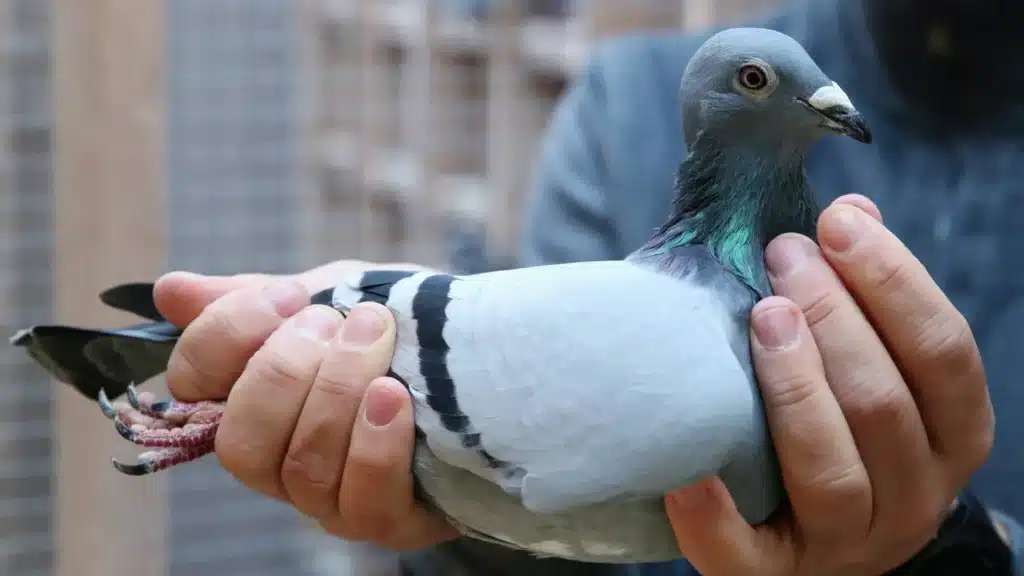
How do you take care of a pigeon?
Proper hygiene maintenance is a crucial part of good bird keeping. A daily clean of the cage or loft, a fresh floor covering of straw or wood shavings, plus new, clean water twice daily and a daily supply of fresh food is essential. To keep the feed and water containers clean too, sterilizing them regularly.
Habitat: Create a secure and comfortable living space. For pet pigeons, an aviary or spacious cage with perches and nesting boxes is ideal. Wild or rescued pigeons may need a temporary enclosure until they are ready for release.
Diet: Offer a balanced diet consisting of seeds, grains, and fresh vegetables. Ensure access to clean, fresh water at all times. Pigeons may also benefit from grit and calcium supplements.
Hygiene: Maintain a clean environment by regularly cleaning the enclosure or cage. Groom pigeons as needed, helping them stay clean and healthy.
Health Monitoring: Watch for signs of illness, such as changes in behavior, appetite, or droppings. Consult with an avian veterinarian for regular check-ups and immediate attention when needed.
Social Interaction: Spend time with your pigeon to build trust and companionship. Pigeons are social animals and thrive on interaction.
Respect Their Nature: Allow pigeons to express their natural behaviors. Provide opportunities for flight, foraging, and exposure to sunlight. Respect their desire for independence while maintaining a caring presence.
Is it hard to take care of a pigeon?
Pigeons are extremely devoted to their family and mate for life. They require fresh food and water and a quick poop-scrape daily and a thorough aviary cleaning weekly. Pigeons are beautiful, peaceful and full of personality. With time and attention, most can be hand-tamed.
Caring for a pigeon can present challenges but is generally not excessively difficult with the right knowledge and dedication. Understanding their specific needs is crucial to providing proper care. One aspect that might be considered challenging is setting up an appropriate living environment. Pigeons need secure shelter, perches, and nesting spaces. Outdoor aviaries or spacious cages are ideal. Regular cleaning to maintain hygiene is essential.
Diet can be another aspect that requires attention. While their primary food source is seeds and grains, providing a well-balanced diet with necessary supplements like calcium and grit can be a learning curve. Monitoring their health can also be a challenge. Recognizing signs of illness and finding an avian veterinarian experienced with pigeons is vital for their well-being.
Social interaction is essential for pigeons, and building trust and companionship takes time and patience. Respecting their natural behaviors, such as flying, foraging, and nesting, may require some adjustments to their living environment.While taking care of a pigeon can pose some challenges, it is not excessively difficult for those willing to invest time, effort, and care into understanding and meeting their specific needs.
Is pigeon good to keep at home?
Vastu experts state that the arrival of birds in the house implies an improvement in life’s fortune. In many cultures, pigeons are considered to be symbolic of fertility and prosperity, fortune, luck, and transformation. Having a pigeon’s nest in the home will bring prosperity and peace.
Pigeons are known for their calm and gentle demeanor, making them relatively easy to handle and maintain as pets. They can form strong bonds with their caregivers, demonstrating affection and trust over time. Their cooing sounds and graceful movements can be soothing and enjoyable to watch.
Pigeons are also relatively low-maintenance compared to traditional pets like dogs or cats. They don’t require walks or extensive grooming, and their diet mainly consists of seeds and grains, making them cost-effective to feed.
It’s essential to consider some challenges when contemplating pigeon ownership. Pigeons are social birds and thrive on companionship, so they may become lonely if kept alone. They require a clean and secure habitat, which might require space and some upkeep.
Do pigeons need sunlight?
Birds need access to direct, full-spectrum UV (ultraviolet) light to be happy and healthy. Ideally, they’d get this through safe, protected outdoor time straight from the natural sun for at least 30 minutes a day, 3 times a week is better.
Yes, pigeons do need sunlight, just like many other living creatures. Sunlight is essential for various aspects of their health and well-being. Firstly, exposure to natural sunlight helps pigeons synthesize vitamin D, which is crucial for their bone health and overall vitality. Vitamin D aids in the absorption of calcium, a mineral necessary for strong bones and eggshell formation in breeding pigeons.
Sunlight also plays a role in regulating pigeons’ circadian rhythms. Exposure to natural light during the day helps establish their internal body clocks, which can affect their sleep patterns, feeding behaviors, and overall daily activity.
Sunlight contributes to the mental and emotional well-being of pigeons. It can positively influence their mood and help reduce stress, leading to happier and healthier birds. For pet pigeons kept indoors, providing access to natural sunlight or using full-spectrum lighting can help replicate the benefits of sunlight exposure.
This ensures that they receive the necessary UV rays to maintain their health and well-being. Sunlight is indeed a crucial element of pigeon care, impacting their physical, mental, and emotional health. Whether kept outdoors or indoors, ensuring access to adequate natural or artificial sunlight is vital for the overall well-being of these remarkable birds.
What do pigeons like to eat?
Feral pigeons eat a variety of foods including grains, seeds, cereal crops, plant seeds and peas. They will also feast on berries, fruits and vegetables. Pigeons are generally herbivores but they will eat insects, snails and worms when they need to.
Seeds and Grains: Pigeons are primarily granivorous, meaning they love seeds and grains. Some favorites include millet, wheat, corn, barley, and sunflower seeds. These provide essential nutrients and energy.
Fresh Vegetables: Pigeons enjoy a variety of fresh vegetables, such as lettuce, spinach, peas, and carrots. These vegetables provide vitamins and minerals, enhancing their diet’s nutritional balance.
Bread: While pigeons are known for their association with bread crumbs in urban environments, bread alone is not a complete or nutritious diet. It should be offered as an occasional treat rather than a primary food source.
Grit: Pigeons need grit, small rocks or pebbles, in their diet to aid in digestion. It helps them grind down seeds in their gizzard, improving nutrient absorption.
Calcium Supplements: Providing access to calcium supplements, like crushed eggshells or commercial supplements, is essential, especially for breeding pigeons, as it supports strong eggshell formation.
Water: Fresh, clean water should always be available, as pigeons require regular hydration, and it aids in digestion.
What is a pigeon afraid of?
Pigeons hate the sight or presence of other domineering birds, such as birds of prey. This is what makes falconry such a successful deterrent in getting rid of pigeon populations. Pigeons do not like strong smells, such as cinnamon or hot pepper juice or spray.
Predators: Pigeons are prey animals, so they are naturally wary of potential predators. They may become frightened by the presence of cats, dogs, hawks, and other birds of prey.
Loud Noises: Sudden loud noises, such as fireworks, thunderstorms, or construction work, can startle pigeons and trigger their fear response.
Fast Movements: Rapid or unexpected movements can cause pigeons to become anxious or fly away in alarm.
Crowded or Confined Spaces: Pigeons may feel uncomfortable and stressed in crowded or confined areas, such as bustling urban environments or enclosed spaces with limited room to move.
Unfamiliar Objects: Pigeons are naturally curious but may initially be cautious or fearful of unfamiliar objects or changes in their environment.
Human Interactions: While some pigeons can become quite tolerant of human presence, others may be nervous around people, especially if they’ve had negative encounters.
Lack of Food: Hunger or difficulty finding food can create anxiety in pigeons, as they rely on a stable food source for survival.
Should you touch a pigeon?
You do not have to be afraid of handling pigeons. They don’t bite and are harmless. And catching the pigeon is much less dangerous to the bird than a predator will be. It is extremely rare for a human to get sick from a pigeon.
Wild Pigeons: Wild pigeons are typically wary of human contact. Approaching and touching them can cause stress and fear, which may lead to injury or even death in extreme cases. It’s generally best to avoid touching wild pigeons and instead observe them from a distance.
Domestic Pigeons: Domesticated pigeons, especially those raised from a young age and used to human interaction, may be more tolerant of touch. However, it’s crucial to handle them gently and respectfully to avoid causing stress or harm.
Health and Safety: Before touching any pigeon, ensure that you are in good health and have clean hands. Pigeons can carry diseases, and close contact can pose health risks to both humans and the birds.
Trust and Bond: If you wish to touch a domestic pigeon, it’s essential to build trust gradually. Spend time near them, offer treats, and let them come to you on their terms. Rushing into physical contact can damage the trust you’re trying to establish.
Respect Their Comfort Zone: Pay close attention to the pigeon’s body language. If they appear agitated or uncomfortable, it’s best to back off and give them space.
What calms pigeons?
Don’t worry about stressing the bird. Hold the pigeon with one side of his body against yours and cover his head with your hand or coat, scarf, this calms them down. They will also feel safe when you place them in a closed box, in a warm, quiet place
Peaceful Environment: Providing a quiet and calm living space can help pigeons feel secure and relaxed. Minimize loud noises and sudden disturbances.
Routine: Establishing a regular feeding schedule and consistent daily routines can be reassuring to pigeons. Predictability in their environment reduces stress.
Companionship: Pigeons are social birds, and the presence of other pigeons can provide comfort and a sense of safety. Loneliness can be a significant source of stress.
Gentle Handling: If you have domestic pigeons, handle them gently and with care. Positive interactions with humans can build trust and create a calming bond.
Safe Perches and Nesting Areas: Pigeons feel secure when they have safe and comfortable perches and nesting spots. Providing suitable places for rest and shelter contributes to their sense of calm.
Sunlight: Exposure to natural sunlight helps regulate their circadian rhythms and can have a calming effect on pigeons.
Music and Sounds: Some pigeons may find soothing background music or gentle, rhythmic sounds calming. However, it’s important to monitor their reactions, as loud or abrupt noises can be stressful.
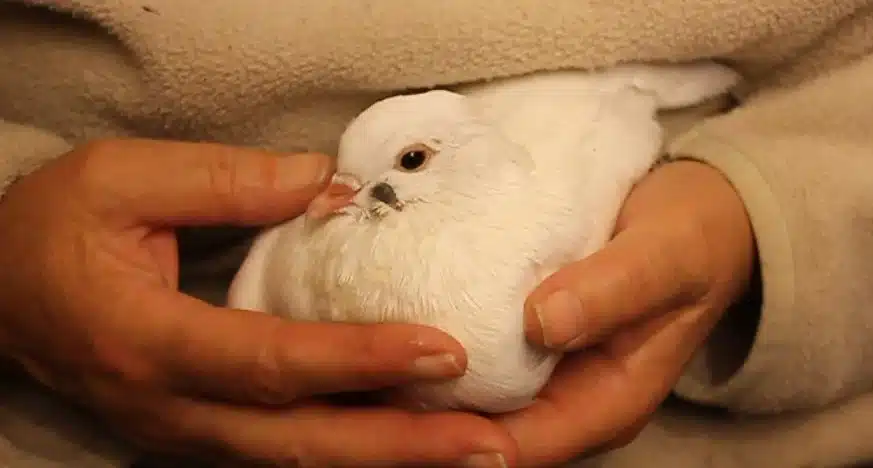
Conclusion
Caring for pigeons requires dedication and a deep understanding of their unique needs. Pigeons, often overlooked or considered common city birds, deserve our attention and respect as sentient creatures. Encompassing their habitat, diet, hygiene, health, social needs, and respect for their natural behaviors. Creating a suitable living environment with secure shelter, perches, and nesting spaces is the foundation of pigeon care. These birds need a safe and comfortable home to thrive.
A well-balanced diet, comprising seeds, grains, fresh vegetables, grit, calcium supplements, and access to fresh water, is paramount for pigeon health and vitality. Maintaining a clean and hygienic living space is crucial to prevent illness and ensure their well-being. Regular cleaning, grooming assistance, and quarantine measures when introducing new pigeons are essential. Vigilant health monitoring and prompt veterinary care for any signs of illness are fundamental to keeping your pigeons healthy and happy.
Pigeons are social animals that benefit from human interaction. Handling them gently, observing flock dynamics, and spending quality time with them can build trust and strengthen the bond. Respecting their natural instincts, including their love for flight, foraging, sunlight, and the opportunity to mate and nest, is key to their well-being. Independence and the understanding that pigeons communicate through cooing and body language further enrich their lives.

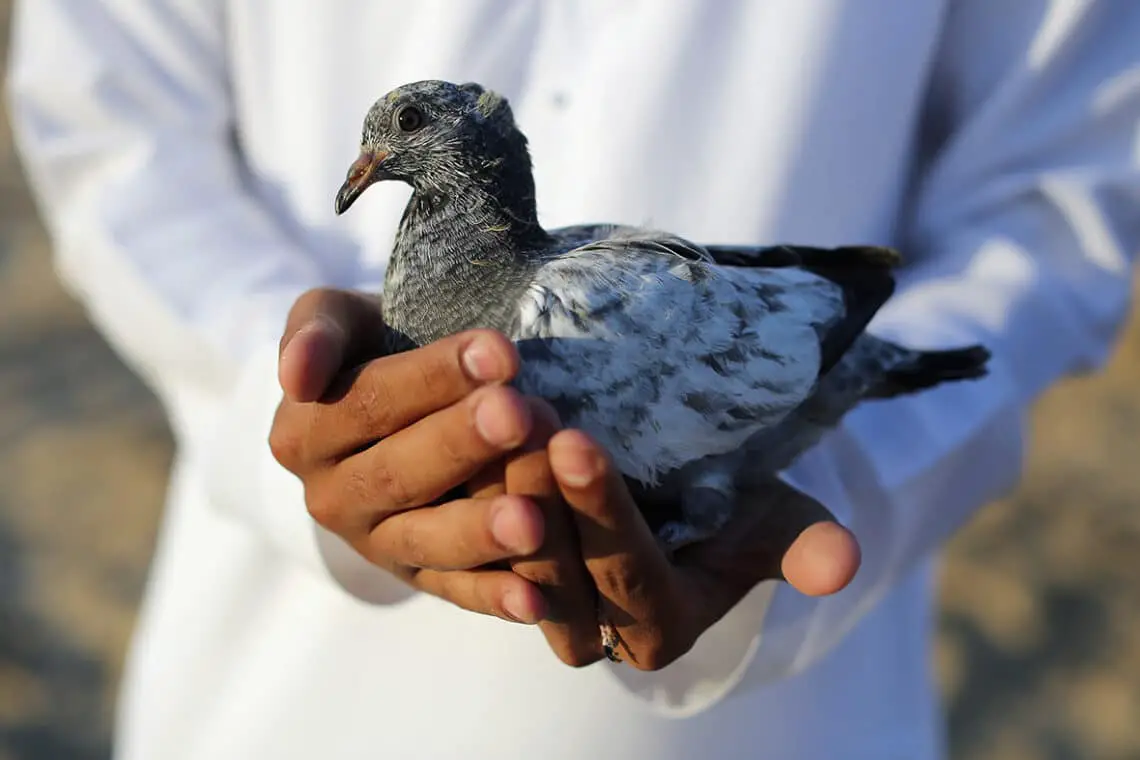
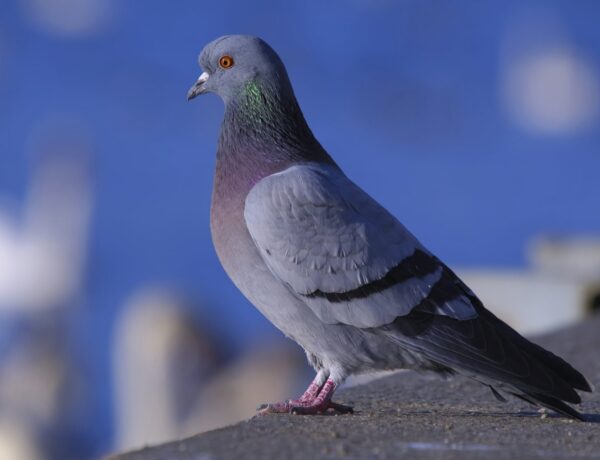
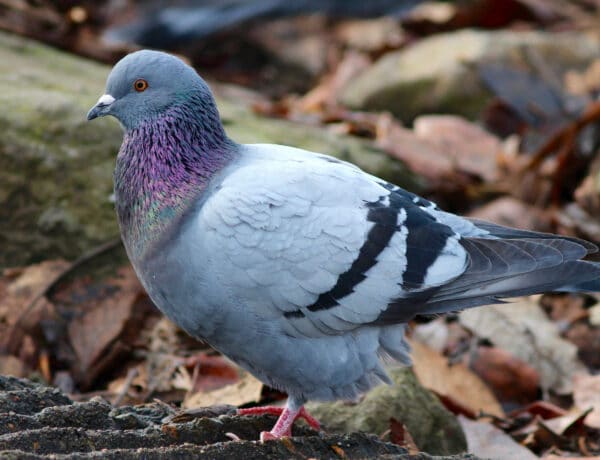
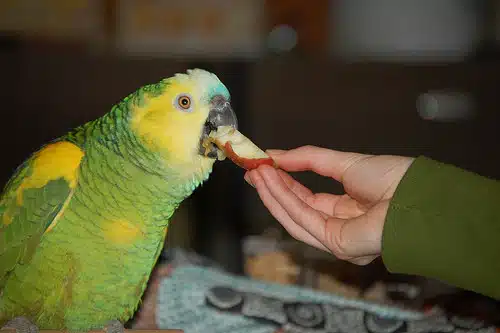
No Comments